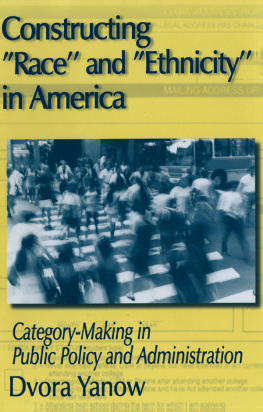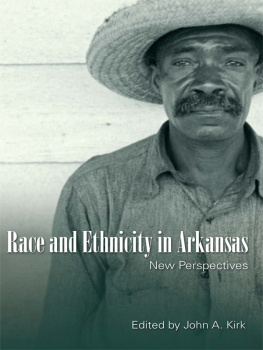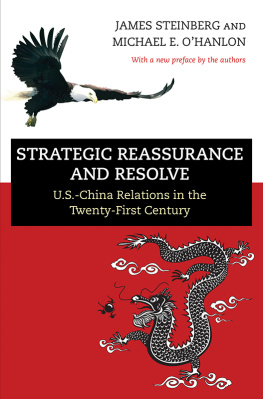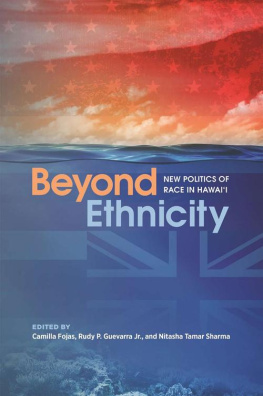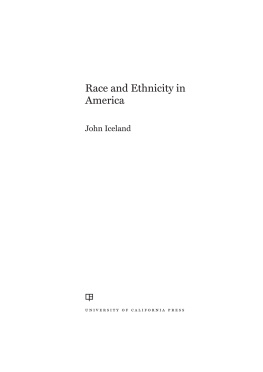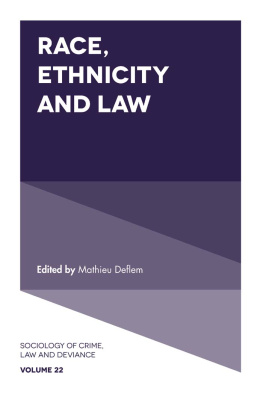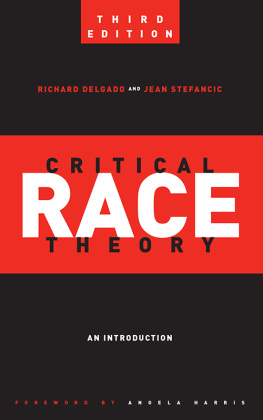Stanford University Press Stanford, California
2007 by the Board of Trustees of the Leland Stanford Junior University.
All rights reserved.
No part of this book may be reproduced or transmitted in any form or by any means, electronic or mechanical, including photocopying and recording, or in any information storage or retrieval system without the prior written permission of Stanford University Press.
Printed in the United States of America on acid-free, archival-quality paper
Library of Congress Cataloging-in-Publication Data Steinberg, Stephen.
Race relations : a critique / Stephen Steinberg.
p. cm.
Includes bibliographical references and index.
9780804763233
1. Race relations. 2. Racism. 3. Prejudices. I. Title.
HT1521.S65 2007
305.8--dc22
2007007300
Designed by Bruce Lundquist
Typeset at Stanford University Press in 10.5/15 Adobe Garamond
PROLOGUE
A PERSONAL ENCOUNTER WITH THE CANON
He has understood the system so well because he felt it first as his own contradiction.
Jean-Paul Sartre, Introduction to
Albert Memmis The Colonizer and the Colonized
I N 1974 I CROSSED PATHS WITH GUNNAR Myrdal, the illustrious author of An American Dilemma , published in 1944. This landmark study, lavishly funded by the Carnegie Corporation from its offices on Fifth Avenue in New York City, was prompted by a rise of racial tensions in Northern cities where Southern blacks had migrated in search of opportunity. Its ambitious agenda was to provide a comprehensive account of race in America. It was the largest and most costly social research project to date, and upon publication An American Dilemma became an instant classic. Now, thirty years later, at the age of seventy-five, Myrdal had come to New York, to work on An American Dilemma Revisited in collaboration with Kenneth Clark, the eminent black psychologist whose research, like Myrdals, was cited in the 1954 Supreme Court decision that racial segregation in public schools was unconstitutional.
Benjamin Ringer, the chair of Sociology at the CUNY Graduate Center, organized a weekly seminar of faculty and students on the subject of race in America. Each week a different professor was assigned responsibility for kicking off the seminar by presenting the results of his or her work. When it was my turn at the lectern, I decided to undertake a retrospective examination of the criticism of An American Dilemma by contemporaneous critics on the Left who challenged Myrdals celebrated study.
My purpose was not to engage in personal or political mischief. On the contrary, I thought, naively as it turned out, that Myrdal would welcome this challenge from a neophyte, and might find it productive to revisit old debates and to engage his critics as he launched his new study of race in America. I had been particularly persuaded by Oliver Coxs brilliant critique of An American Dilemma . Cox praised Myrdal for turning up a vast body of useful facts about race in America, but he assailed his theoretical framework, especially his failure to explore the structural basis and material sources of prejudice. As Cox wrote: Myrdal does not bring to light the social determinants of this well-known dilemma : he merely recognizes it and rails against its existence. I found all of this enormously persuasive, even revelatory, and I was deeply curious to find out how Myrdal would answer his critics.
Only later did I learn that Myrdal had a visceral antipathy to Marxism, and that, like many other exalted figures, he did not take well to criticism, especially of the work that made him famous. I was spared his umbrage, however. As fate would have it, on the day Steinberg was slated to go one on one with Myrdal, the seat that Myrdal occupied at the head of the table was empty. Myrdal had left for Stockholm to receive the Nobel Prize!
It was perhaps for the better that I was left to shoot hoops by myself. I was oblivious to the fact that such a confrontation was fraught with peril for me as a junior faculty member. Had Myrdal been there, he never would have written the letter of recommendation that presumably clinched my award of a prestigious National Endowment of the Humanities fellowship for the next academic year. Perhaps it is just as well that I did not raise the hackles of our illustrious guest by confronting him with heretical ideas that exposed his vulnerabilities. All the same, the entire episode left me with a nagging question : How is it that Myrdal became an exalted figure both inside and outside academia, while Oliver Cox, his brilliant critic, fell into obscurity, relegated to teach at black colleges? This question has far-reaching implications for the sociology of knowledge. What does Myrdals elevation and Coxs marginalization tell us about the formation of sociologys canon? About the racialization of knowledge? About the occlusion of ideas that smack of Marxism?
This quandary provided the starting point for my book Turning Back: The Retreat from Racial Justice in American Thought and Policy , published in 1995. I devoted the first chapter to a critique of An American Dilemma and the liberal orthodoxy that it did so much to engender. There was poetic justice when my book received the Oliver C. Cox Award for Distinguished Antiracist Scholarship, presented by the Section on Racial and Ethnic Minorities of the American Sociological Association. Clearly, the very fact that such an award exists proves that today there is political space for opposition to hegemonic discourse that did not exist when Coxs prolific writings were studiously ignored by mainstream sociologists.
Although I followed Coxs lead by challenging Myrdals theoretical structure, I had great admiration for Myrdal the man. In What Is History? Edward Carr writes, Study the historian before you begin to study the facts. Indeed, it is always revealing to know the person behind the text, and to make connections between the authors personality and sensibilities, on the one hand, and the ideas inscribed indelibly on the printed page, on the other. I admired Myrdals boundless energy and the exuberance he brought to his intellectual endeavors. Yet at times this exuberance was an intellectual liability: Myrdals critics accused him of being too reverential of the United States and too optimistic about the future of American democracy, and therefore prone to underestimate the extent that racism was embedded in institutions and therefore immune to change. On a personal level, however, Myrdals exuberance was of course endearing, all the more so in an elderly man who seemed totally invested in his work.
At another of our weekly seminars, a psychologist presented the results of his empirical research on philo-Semitism. Im not entirely sure, and neither apparently was Myrdal, what admiration of Jews had to do with loathing of blacks. In any event, when the formal presentation was over, Myrdal turned to me and said scornfully: Thats whats wrong with you American sociologists. Rome is burning, and youre doing this.


